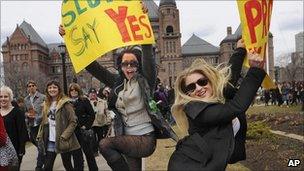'SlutWalk' marches sparked by Toronto officer's remarks
- Published

Protesters say they are reclaiming the word "slut"
A new protest movement sparked by a policeman's ill-judged advice to women students to "avoid dressing like sluts" has taken root in the US and Canada.
Thousands of people - some dressed in jeans, others more provocatively - are taking part in marches, or "SlutWalks".
The aim, say organisers, is to highlight a culture in which the victim rather than rapist or abuser is blamed.
About 2,000 people took part in a "SlutWalk" in Boston on Saturday.
Boston organiser Siobhan Connors explained: "The event is in protest of a culture that we think is too permissive when it comes to rape and sexual assault.
"It's to bring awareness to the shame and degradation women still face for expressing their sexuality... essentially for behaving in a healthy and sexual way," the 20-year-old told the Associated Press (AP) news agency.
Workshops
Police Constable Michael Sanguinetti had been giving a talk on health and safety to a group of students at Osgoode Hall Law School in Toronto when he made the now infamous remarks.
"You know, I think we're beating around the bush here," he reportedly told them. "I've been told I'm not supposed to say this - however, women should avoid dressing like sluts in order not to be victimised."
He has since apologised for his remarks and has been disciplined by the Toronto police, but remains on duty.
Some 3,000 people took part in the first "SlutWalk" in Toronto last month. The SlutWalk Toronto website said the aim of the movement is to "re-appropriate" the word slut.
"Being in charge of our sexual lives should not mean that we are opening ourselves to an expectation of violence, regardless if we participate in sex for pleasure or work," it says.
"SlutWalks" have now been held in Dallas, Asheville in North Carolina, and in the Canadian capital, Ottawa, and are planned for Seattle, Chicago, Philadelphia, Reno and Austin.
Everybody, from singles, couples, parents, sisters, brothers, children and friends, are encouraged to join in.
The rallies typically end with speakers and workshops on stopping sexual violence and calling on law enforcement agencies not to blame victims after sexual assaults, AP says.